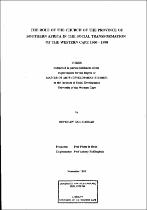THE ROLE OF THE CHURCH OF THE PROVINCE OF SOUTHERN AFRICA IN THE SOCIAL TRANSFORMATIO OF THE WESTERN CAPE 1960 - 1990
Abstract
This study reflects the vital role the church should play in the social transformation of society. It undoubtedly has the potential to be a strategic organisation for social change. However, in the past it has failed to reach that potential. The hope for the future is that the church will embrace that potential and become active in the process of social transformation. The Church of the Province of Southern Africa (CPSA) has been the researcher's spiritual home for her entire life. During this time, and particularly over the past five years, she has sought to
find her place in the church's inflexible, bureaucratic and patriarchal structure. While this study was in the final stages of being written, the CPSA took the historic decision to ordain women to the priesthood. Her personal struggle had been vindicated. However, more importantly, the church's decision attests to that organisation's potential for creative change. Thus this study is dedicated to the members of the CPSA in the Diocese of Cape Town, in the hope that they will embrace the challenge, both as individuals and as a community to become active agents of social change. The field research was conducted during the period March 1989 to March 1990 by the researcher herself, who was a paid employee of the Diocese of Cape Town at the time. Both the promoter and co-promoter of this thesis supervised this research. The results were first published in August 1990 by the Diocese of Cape Town in a report entitled, Voices of the Church: An Anglican perspective on welfare and development in the Diocese of Cape Town. Permission to use the research material in this study has been granted by the Most Reverend Desmond Mpilo Tutu, and is acknowledged with thanks. There are many people who during that period enabled the research to take place because of their willingness, enthusiasm and interest: the Most Reverend Desmond Tutu; Bishop Edward the liaison Bishop; members of Chapter and Diocesan Council; the support committee; the 130 people in the parishes who so willingly shared of themselves and their opinions, and in many instances opened their homes; and the clergy of the diocese, who participated wholeheartedly in the process.

